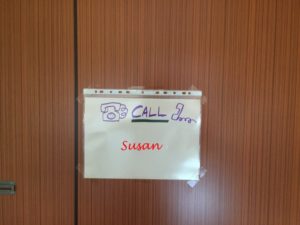
Apr 2017
It all started when I arranged to meet my mum at Chinatown after her work about 2 years ago. I called her on her mobile phone to confirm the meeting venue when she was walking to the bus-stop near her workplace. After about 1.5 hour, she was no-where to be seen. I started getting worried… My mind ran wild on the possibilities that she might have met with an accident!! I called her on her phone and was relieved to hear her voice at the other end. I was dumbfounded when she told me that she was at home. She told me that her usual bus came and she boarded it out of habit. I couldn’t believe my ears, we just spoke about our meeting in Chinatown before she arrived at that usual bus-stop and boarded her usual bus home. As she was still working and socially very active with her church activities and events, we dismissed it as humans are creatures of habits…
The red-light started flashing during the following Chinese New Year when my friend texted me to share that my mum had asked her the same question (“Is she your daughter?”) three times during their MRT ride (which was only one MRT station away)! A nurse will always be a nurse. So instinctively, different hypothesis / possibilities ran through my head. Was she trying her best to be friendly? Was she just trying to find topic to make conversation? I finally admitted to myself that I could no longer make any excuse for her behaviour, and again dismiss this incident as “habitual”. Red flag number 1 – Poor recent memory. Thanks to my 3 years of nursing education, I was trained to be observant to observe and watch out for signs and symptoms of recovery or deterioration in our patients. I put my radar up high and wide, and started monitoring my mum’s behaviours and conversations, conducting my own mini assessments and tests on her. I also got feedback from loved ones, even her then-colleagues whom I would at times meet at conferences or events. Withdrawal from social activities was her second red flag. From being an extremely socially-active person who was hardly home to her wanting to stay home more often, becoming more unmotivated to go out and socialise, to the extent that she was not keen to attend her church routine activities and events. At the same time, feedback was also coming in at an increasing rate from every other aspects of her life about her increasing forgetfulness.
Are you worried about the possibility of yourself / your loved one suffering from dementia? No two persons are affected by dementia in the same manner.
Both late-maternal-grandparents had dementia during their final years. One participant from my seminar asked me if they were affected in the same manner. The answer was “No, no two persons are affected by dementia in the same manner.” Although they both had changes in mood and personality, yet they displayed very different symptoms. My late-grandfather went from being a quick-tempered and quick to speak his mind guy to this mild, always smiling guy who hardly uttered a word except for the “PONG,PONG,PONG” during our occasional mahjong sessions. Yes, he was an avid mahjong player who played mahjong every weekend for most part of his life! Some parts of them do stay with them even when part(s) of their brains are affected by dementia. For him, the ‘Language’ part of his brain was obviously affected, causing him to hardly speak and only to raise his hand, nod at you and smile whenever spoken to. On the other hand, my late-granny became this impatient lady who would not hesitate to curse at you to show her displeasure as dementia affected the part of her brain controlling the control of anti-social behaviours. Before living with dementia, she was this kind, caring and gentle lady all her life. I had never witnessed her use a single curse word at anyone in my years with her. (Yes, I spent a lot of time with her when growing up and beyond! She was very dear to me, hence, it was extremely difficult for me to watch her deteriorate as her dementia got increasingly severe.) I also observed role reversal in them. My late granny used to take care of every needs of her husband and he hardly explicitly demonstrated care and attention for her. When they were living with dementia, my grandpa started watching out for my granny and became protective over her and her needs. He even stretched out to hold her hand during his final moments. Aww, such endearing moments 🙂
Check out the following 10 warning signs of Alzheimer’s from the Alzheimer’s Association here:
- MEMORY LOSS THAT DISRUPTS DAILY LIFE
- CHALLENGES IN PLANNING OR SOLVING PROBLEMS
- DIFFICULTY COMPLETING FAMILIAR TASKS AT HOME, AT WORK OR AT LEISURE
- CONFUSION WITH TIME OR PLACE
- TROUBLE UNDERSTANDING VISUAL IMAGES AND SPATIAL RELATIONSHIPS
- PROBLEMS WITH WORDS IN SPEAKING OR WRITING
- MISPLACING THINGS AND LOSING THE ABILITY TO RETRACE STEPS
- DECREASED OR POOR JUDGMENT
- WITHDRAWAL FROM WORK OR SOCIAL ACTIVITIES
- CHANGES IN MOOD AND PERSONALITY
Since we are not geriatricians, it’s always better to get it checked by a professional. By early this year, I decided that the symptoms seemed to be progressing and it was time to consult a doctor. Being highly concerned, hence, impatient to know the outcome, I opted to pay more and went to a private practice. I asked around for recommendation on someone who is good with dementia treatment and care, and my colleague told me to go to Dr Chong Mei Sian from The Geriatric Practice at Mount Elizabeth Novena Specialist Centre. I made an appointment, we went there. Applying my healthcare professional’s judgement lens, I found Dr Chong and her team to be very warm and professional. They made my mum feel at ease and comfortable while interviewing her to get as much information as possible so as to piece the picture together. Upon completing the initial interviews and assessments, Dr Chong patiently explained to me about what was happening to my mum. Of course, the usual blood tests, MRI and scans were needed for an accurate diagnosis. I explained to Dr Chong that it would be a lot more affordable for us to go to the public hospital to get those necessary diagnostic tests done. She was very understanding and open about it; and even advised me on what to inform the doctor at the public hospital. Her initial diagnosis was mild cognitive impairment, and her diagnosis was confirmed by the doctor at the public hospital after reviewing the results from the necessary diagnostic tests. Kudos to Dr Chong and her team!

Phew, it’s only MCI, it’s not dementia yet! 🙂
According to HealthXchange.sg by SingHealth, MCI is different from dementia as it does not impair a person’s ability to lead a normal life. Dr Nagaendran Kandiah (Senior Consultant at the Department of Neurology, National Neuroscience Institute (NNI), a member of the SingHealth group) explains that “MCI is an intermediate stage between the normal ageing of the brain and the more pronounced cognitive decline caused by dementia. These patients can still live independent, fulfilling lives including handle finances.” Although people with MCI face a higher risk of developing dementia in later life, MayoClinic states that there are people with MCI who never get worse, and in fact there are a few who eventually get better.
According to MayoClinic, people with MCI may experience any or all of the following:
- Frequent forgetfulness including forgetting important events such as appointments or social engagements.
- Losing train of thought or unable to keep up with the thread of conversations / movies.
- Overwhelmed by decision-making, interpreting instructions or planning steps to complete a task.
- Having difficulty in way-finding around familiar environments.
- Increased impulsiveness
- Unable to show good judgment more frequently.
- Above-mentioned change(s) is/are noticed by family / friends.
People with MCI may also experience emotional signs and symptoms like:
- Anxiety
- Depression
- Irritability and aggression
- Apathy
Awareness is the first step towards understanding and appropriate management. Upon knowing that my mum has MCI, I have informed my whole family about it. Now, everybody shows extreme patience and understanding towards mum. We readily forgive her and not get angry with her for her at times ‘naughty’ memory slip-ups like making you wait in vain as she forgot to show up for your lunch or dinner dates! Do not hesitate or fear contacting your family doctor / a geriatrician to confirm if it is dementia or not. It all starts with AWARENESS…
References:
- https://www.healthxchange.sg/seniors/ageing-concerns/mild-cognitive-impairment-signs-symptoms
- http://www.mayoclinic.org/diseases-conditions/mild-cognitive-impairment/home/ovc-20206082
May 2017
And so it happened AGAIN!
I was at home and called mum, “Hello mummy, are you at home?”
“Yes” came the reply on the other side of the phone line.
“I’m coming over to your house right now to pass you some stuff that I had bought for you.”
“Ok.”
So happily, I took the fairly crowded mrt for 12 stations. As I was walking towards her house, I called her again to find out what she would like for lunch since it was about lunchtime. “Hello mummy, I’m reaching your house, what will you like for lunch?”
“I’m in a cab with my friend, we are going out for lunch. You don’t come” was her reply.
WHAT! was my internal response. This could not happen. “What do you mean you are in a cab with your friend? I told you that I was heading to your house to pass you the stuff that I had bought just about 30 minutes ago.” Denial… Yes, I was pretty much in denial as you are probably thinking right now. Or rather, I was desperate… I spent time travelling to her house and she stood me up just like that… her friend came and scooped her up in a cab, like a white knight in her life! I wanted to scream at her at that moment. Argh…. I was screaming internally. Instead, I said “Oh, ok. I’ll put the stuff outside your house and you pick them up when you are back from lunch.” Ok was her response, and the line went dead. Despite all that I know about dementia and mild cognitive impairment (MCI) which my mum is diagnosed with, I was fuming mad!! Yes, in my previous blog “Do I have Dementia?”, I did share that “frequent forgetfulness including forgetting important events such as appointments or social engagements”(source: MayoClinic) is one of the symptoms of MCI, but at that moment, momentarily I was unable to accept that It’s actually happening to me, moi! So, I resorted to calling my aunt to let out my steam while walking to my mum’s house to place her items by her door as agreed.
Not long after, I started hearing different stories (a.k.a complaints) about how my mum had forgotten about appointments that she had made with her friends, her sisters, her hairdresser, and even the house cleaning service provider. The person whom my mum had stood up experienced similar shock, disbelief and frustration as me especially when they had just called her that morning to reconfirm their appointment. These incidents made me conclude that the principle ‘First in, first out’ is the current trend for my mum: – I go out with whomever who last calls and/or turns up at my house to get me as I don’t remember you calling me (at times just a few hours ago) to arrange an outing or to remind me about our pre-arranged date. It’s understandable that friends and relatives started getting upset about the (at times, repeated) situation(s)! Some of them who knew about her forgetfulness would actually give her reminder call(s) at least one or two hours before their date, thinking that that should help her remember, therefore, be there. And despite that, my mum was somewhere else, totally forgotten about that outing / appointment while they had invested time and effort to remember and show up would naturally be upsetting. To add on, some of them might not even be aware that my mum has MCI as she is still largely the same with forgetfulness being her only symptom so far. Hence, some of those who were stood up by my mum did not hesitate to show their unhappiness about the missed appointment, which they of course had 100% right to do so. She did not say it, but it must be a not-such-a-great feeling if every other person you spoke to kept reminding you about you not remembering appointments and asking you why, just like when loved ones kept asking a person with dementia what’s my name, what’s her name and his. L “I am unable to remember. Period! I DID NOT intentionally not remember. I will not want to upset you or anyone else on purpose by intentionally not remember.” I mean even for some of us without MCI nor dementia, we do forget names and appointments at times; that’s why some of us are highly dependent on the calendar function in our smart phones. Thank you, smart phones! J
I’m one of those! Yet, it’s just that my mum or some of the persons with dementia may not be savvy enough with smart phone to use its reminder or calendar function.
As I am writing this, the cleaning service provider has informed us that she would not take on cleaning assignment to clean my mum’s house moving forward. So we have to look for another service provider. We will find ways to adapt to the challenges posed in the coming years – after we are human, and human’s ability to rapidly adapt and adjust to varying environmental conditions has ensured our survival until now! :-p
I’m grateful to my friend, Allen Power, for his book Dementia Beyond Disease which had taught me about strength-based approach and person-centredness when caring for persons with dementia. Nothing nice will come out of our incessant focus on other’s weaknesses. Let’s make life more pleasant for others by focusing on their strengths while thinking of different ways to manage their weaknesses. The persistent, and must-find-a-solution traits of me started me thinking of solutions to help my mum. And after thinking for a while, viola!

Happy Mother’s Day 2017, Mummy!
I went to my mum’s house and set this up on her door, telling her that she would have to write the name of the person who called to say that he/she would be coming over or meeting her soon before hanging up the phone. And she would have to call the person whose name appeared on the board to confirm any impending appointment before leaving home. However, if there’s no name on the board, she would be free to go out with whoever pursuing whatever activity they felt like at that point of time.

Then I took a picture of this solution and forward it to the rest of my family informing them about it with detailed ‘implementation’ instructions. Yes, it was like a corporate project. As usual, I will observe and collect feedback from various sources for a few weeks to determine if it is a viable solution.
I arranged with my family for Mother’s Day 2017 celebration to be held at my house. As I was planning the menu for the party, Al’s book on strength-based approach flashed across my mind. How can I make my mum feel better about herself? Then a thought popped up! I would invite my mum to cook one or maybe two of the family’s favourite dishes while I would be alongside to help her so that it would not be an overwhelming and unpleasant experience for her. About slightly more than a year ago, my mum had decided to stop cooking for the family as it had become pretty stressful for her to single-handedly prepare a meal for a party of people. We haven’t tasted her cooking sinceL. She was a pretty good cook, and we love a few of her dishes. Then I stopped for a moment and asked myself, “The party is meant to celebrate Mother’s Day and yet I am making my mother ‘work’ – to cook for the celebration. Is this even right?” My moral compass took over. I pondered on this question for quite a while. Thoughts on how I regret not taking a single picture at that dinner with my late-grandmother years back, as I did not know that that would be the LAST dinner of us enjoying pasta at a restaurant, my last memory of my late-grandmother enjoying her pasta at an alfresco restaurant. I loved taking my late-grandmother out for meals, the smile and the satisfaction of her face would just melt my heart. That dinner, she had to be transported with her wheelchair as she was no longer able to walk independently but she’s still clear in her mind. We struggled with getting her in and out of the vehicle, but all the perspiration and manual lifting were totally worthwhile as we were rewarded with her smiles and presence during that dinner. Subsequently, dementia slowly took my favourite grandmother away from me. She was not able to swallow well, not able to hold up her head using her neck muscles, and ultimately lost her lucidness and was bed-ridden. If I had knew that that dinner would be our last dinner together, I would have taken pictures and videos… It still breaks my heart thinking of it now and I am still filled with deep regrets. I always believe that there’s a lesson to be learnt behind all that had happened to us though. So I decided that since we don’t know how the MCI will be progressing for my mum in the coming months and years, and now that she is still able to, on top of the amount of negative feedback that she had been receiving from people around recently, getting her to cook for the family would provide her with an opportunity to use her existing strengths, making her feel good. And seeing us enjoying the meal that she prepares would make her feel happy. So yes, mum cooked this Mother’s Day! Though there were hiccups, she did not give me the full instructions and I did not prepare some of the necessary ingredients, but we managed to pull it through with my aunt coming in to help as well. So we got to enjoy my mum’s yummy chap chye and glutinous rice. Everyone was happy!

So yes, don’t live to regret. Be kind and compassionate, make others feel better by focusing on their strengths not weaknesses. Everyone is different. Make life meaningful for others by creating opportunity for them to make use of their existing strengths while finding a solution to adapt and manage their weaknesses.

